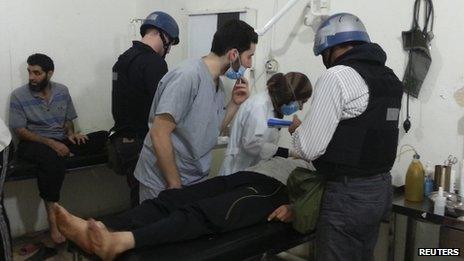Syria chemical attack undeniable, says John Kerry
- Published
John Kerry: "There is a clear reason that the world has banned entirely the use of chemical weapons"
US Secretary of State John Kerry has condemned what he said was the "undeniable" use of chemical weapons by the Syrian government.
He described recent attacks in the Damascus area as a "moral obscenity".
The US and its allies are considering a response including possible military strikes on Syria, although Russia - Syria's ally - has warned against this.
Earlier on Monday, United Nations chemical weapons inspectors were fired on while investigating the attacks.
The team came under sniper fire while travelling to one of the five sites around Damascus where hundreds of people were reported to have been killed on 21 August.
The Syrian government has denied launching any chemical attacks and instead blamed rebel fighters.
'Heinous weapons'
"What we saw in Syria last week should shock the conscience of the world. It defies any code of morality," Mr Kerry said at a news conference on Monday.
"Make no mistake, President Obama believes there must be accountability for those who would use the world's most heinous weapons against the world's most vulnerable people."
The US administration had additional information about the attacks that it would make public in the days ahead, he added.
Mr Kerry said the delay in allowing UN inspectors to the sites was a sign the Syrian government had something to hide.
"Instead it attacked the area further, shelling it and systematically destroying evidence. That is not the behaviour of a government that has nothing to hide. The regime's belated decision to allow access is too late and is too late to be credible," Mr Kerry said.
Later, US White House Spokesman Jay Carney echoed Mr Kerry's comments, saying: "There is very little doubt in our mind that the Syrian regime is culpable."

UN inspectors spoke to doctors and survivors of the attack in two hospitals
Syrian President Bashar al-Assad warned the US against military intervention in an interview with Russian newspaper Izvestiya on Monday.
"If someone is dreaming of making Syria a puppet of the West, then this will not happen," he said.
Russian Foreign Minister Sergei Lavrov also told reporters on Monday the West had not produced any proof that President Assad's forces had used chemical weapons.
He was responding to suggestions from some Western countries that military action against the Syrian government could be taken without a UN mandate.
Mr Lavrov said the use of force without Security Council backing would be "a crude violation of international law".
The UN Security Council is divided, with Russia and China opposing military intervention and the UK and France warning that the UN could be bypassed if there was "great humanitarian need".
Washington has recently bolstered its naval presence in the eastern Mediterranean and military leaders from the US, UK and their allies have convened a meeting in Jordan.
Analysts believe the most likely US action would be sea-launched cruise missiles targeting Syrian military installations.
Earlier on Monday, a UN convoy came under fire by unidentified snipers and was forced to turn back to their central Damascus hotel before resuming their journey to the western district of Muadhamiya.
The rebels accused government forces of the attack, while Syrian state media blamed "terrorists".
While neither claim could be verified, UN Secretary General Ban Ki-moon condemned the shooting and asked the UN team in Syria to register a complaint.
"I have instructed [UN disarmament chief] Angela Kane to register a strong complaint to the Syrian government and authorities of opposition forces so that this will never happen and the safety and security of the investigation teams will be secured from tomorrow," he said, speaking from South Korea.
He said the UN team had interviewed witnesses, survivors and doctors as well as collected some samples from two hospitals in the district.
The inspectors are also due to visit areas in the eastern suburbs of Ghouta.
The UN says more than 100,000 people have been killed since the uprising against President Assad began more than two years ago. The conflict has produced more than 1.7 million registered refugees, external.


01:15: 21 August (10:15 GMT 20 Aug): Facebook pages of Syrian opposition report heavy fighting in rebel-held eastern districts of the Ghouta, the agricultural belt around Damascus
02:45: Opposition posts Facebook report of "chemical shelling" in Ein Tarma area of the Ghouta
02:47: Second opposition report says chemical weapons used in Zamalka area of the Ghouta
Unverified video footage shows people being treated on pavements in the dark and in a makeshift hospital
Reports say chemical weapons were used in Ghouta towns of Irbin, Jobar, Zamalka and Ein Tarma as well as in Muadhamiya to the west, but this is not confirmed
Syrian government acknowledges military offensive in the Ghouta but denies chemical weapons use
